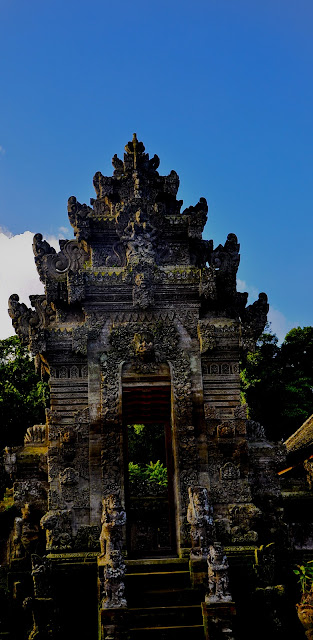
Penglipuran Village is geographically situated in Bangli Regency about 45 kilometers from Denpasar. 75 km from Nusa Dua The way to go to this indigenous village is really accessible. It is due to the location at the main road of Kintamani – Bangli.
The village’s residents are mostly farmers and cattlemen while the others are peddlers, employee and craftsmen. They live in a harmony at which helping one another with unique regulations called as “Awigawig”.
This village’s laws govern their joint lives. Like the
prohibition to dispose humiliating and dirty things in public places. In
addition, family waste is also restricted to dispose into the public drain.
There is a recommendation intended to all the residents to make a waste
disposal system in their own yard. If they violate it they will be fined a
minimum of 50 rupiah.


Admittedly, this is a wonderful and peaceful place to pay a visit. The location is not far from Denpasar in which it takes 45 minutes only using either a private or a public transportation. However, after passing through the gate, no cars seem visible. Only a pedestrian and motorcycle can pass by the main road.
The area has been proclaimed as an indigenous village in Bali since 1992. It seems both the culture and physical situation are unchangeable even though the technology has come into the village. However, do not be mistaken by having an image of primitive people. The youth of village are educated people. Besides, they remain proud to be able to preserve their custom and tradition.
As the consequence, no trash bins are found there.
Surprisingly, the cleanliness is still maintained. They are able to manage
rubbish properly and wisely by dividing them into two parts with different
treatments. Dried waste must be burnt directly while wet ones such as leftovers
can be used as animal feed. Living to help one another, loving the cleanliness
as well as a shameful culture of wasting trash at improper places make the
village high clean and comfortable.
Another unique thing is the village cemetery where there is
an area that consists of three different parts without gravestone and flat on
the ground. The first part is intended to the children’s corpses of 12 years
old or less. The other sides are for those who died normally (because of
illness). The last part is for unnatural death such as because of accident or
murder. The ritual of Ngaben is held only to deliver the spirits of dead
to God.
About Penglipuran Village
- there are several meanings of Penglipuran. Firstly, it means a relaxation because it has been the place of resting since the era of kingdom. Nevertheless, some said that the word of Pengeling Pura means the sacred place to remember the ancestors.
- Polygamy is something unpermitted throughout the village. If any residents dare to do this even they say to be able to perform such fairness, he remains isolated. As the consequences, he can only pass through certain roads along the village, no permission to worship inside temples, and disapproval wedding by local custom figures.
- Walking down the main village roads to the south, there is a heroic monument that is neatly well managed. It was constructed to commemorate and to remember the struggle of Anak Agung Gede Anom Mudita or better known as the Captain Mudita. He died during the revolution against the Dutch colonialism on November 20, 1947.
Penglipuran Village residents are still in effort to provide
“MCK” (Bath, Wash and Latrine) with international standard. It is surely
something to do with the healthy condition of tourism domain. Being in the
village for a day or two days will make a fresh mind. Learning something about
simplicity and sincerity of the local residents are truly beneficial. It was
such the refreshment for lungs that are usually tortured by exhaust fumes. Some
knowledge that is hard to be found in such a crowded and bustling city. What a
nice holiday by getting some amusements until all of a sudden the sound of
cricket reminded me of the passing day.


















No comments:
Post a Comment